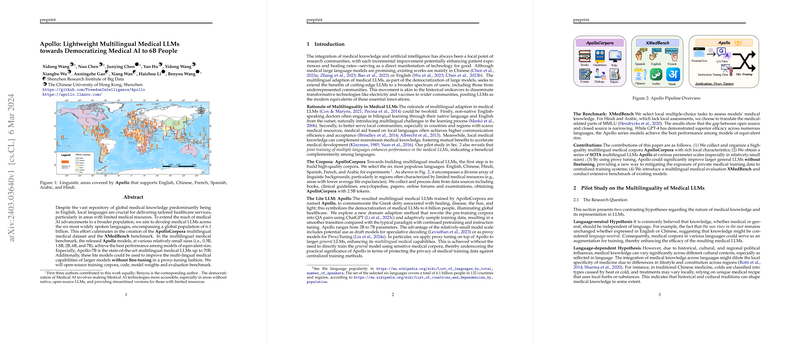Democratizing Medical AI with Apollo: Multilingual LLMs for Global Healthcare
Introduction to Apollo LLMs
The Apollo project represents a significant stride forward in democratizing medical AI by developing Lightweight Multilingual Medical LLMs that aim to make medical knowledge accessible to 6 billion people worldwide. By focusing on the six most widely spoken languages—English, Chinese, Hindi, Spanish, French, and Arabic—Apollo seeks to bridge the language divide in healthcare information and services. This initiative is underscored by the creation of two key resources: the ApolloCorpora, a multilingual medical dataset, and the XMedBench, a benchmark for evaluating multilingual medical LLMs.
Building ApolloCorpora: A Multilingual Medical Dataset
The ApolloCorpora dataset has been meticulously assembled to include high-quality, language-specific medical texts. Sources include medical books, papers, encyclopedias, doctor-patient dialogues, exams, and clinical guidelines, ensuring a rich and diverse corpus. This dataset not only encompasses the vast spectrum of medical knowledge across different languages but also respects the localized nuances and cultural specifics embedded within each language's medical discourse.
The Apollo LLMs: Breaking New Ground in Multilingual Medical AI
The Apollo models, ranging from 0.5B to 7B parameters, have demonstrated remarkable performance, often outperforming models of equivalent size in the multilingual medical benchmark, XMedBench. The Apollo-7B model, in particular, sets a new standard as the state-of-the-art multilingual medical LLM for up to 70B parameter models. The exploration into lightweight models, such as Apollo, signifies a pivotal step towards embedding advanced medical AI capabilities directly into healthcare systems, especially in regions with limited access to medical resources.
The XMedBench: A Benchmark for Progress
The XMedBench serves as a platform to evaluate the medical knowledge and linguistic capabilities of LMMs across different languages. It focuses on assessing models through multiple-choice questions, a format conducive to examining a model's understanding of complex medical concepts and its ability to reason and infer. Results from the XMedBench highlight the Apollo series' superior performance, underscoring the effectiveness of the Apollo models in bridging the gap between AI and medical knowledge across languages.
Practical Implications and Future Horizons
The Apollo project brings to the fore the potential impact of multilingual medical LLMs in transforming global healthcare. By making medical knowledge more accessible across linguistic divides, Apollo contributes significantly toward the democratization of medical AI. Moreover, the adoption of models like Apollo in healthcare systems worldwide could enhance the quality of care and patient outcomes, especially in under-resourced regions.
The project also opens new avenues for future research in AI and healthcare, such as optimizing dataset sampling, refining Proxy Tuning methods, and exploring the combination of different LLMs for enhanced multilingual capabilities. The open-sourcing of the ApolloCorpora and the Apollo models invites the global research community to contribute to these endeavors, fostering innovation and collaboration in the pursuit of making healthcare more accessible and equitable across the globe.
Conclusion
The Apollo project represents a monumental step toward democratizing medical AI through the development of multilingual medical LLMs. By making medical knowledge accessible in the world's most widely spoken languages, Apollo has the potential to revolutionize global healthcare, making it more inclusive and effective. As we look to the future, the continued exploration and improvement of multilingual medical AI hold the promise of a more informed and healthy global population.
